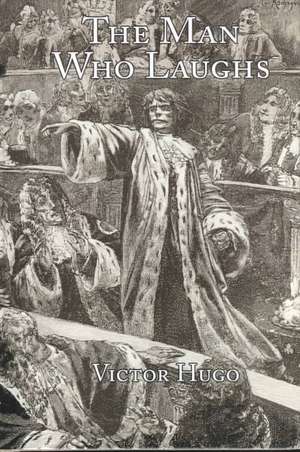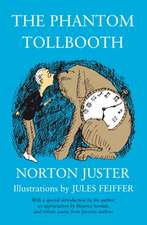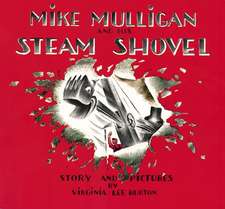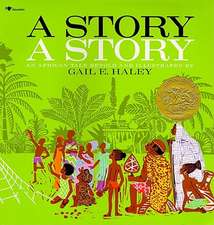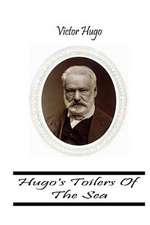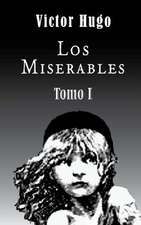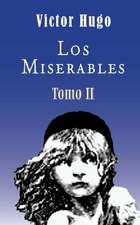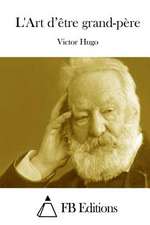The Man Who Laughs
Autor Victor Hugo Shoshana Joy Milgram Traducere de Joseph L. Blamireen Limba Engleză Hardback – 30 apr 2001
The Man Who Laughs
L'Homme Qui Rit
Victor Hugo
"FULL ENGLISH TRANSLATION"
The Man Who Laughs (also published under the title By Order of the King) is a novel by Victor Hugo, originally published in April 1869 under the French title L'Homme qui rit. Although among Hugo's most obscure works, it was adapted into a popular 1928 film, directed by Paul Leni and starring Conrad Veidt, Mary Philbin and Olga Baclanova. It was also again recently adapted for the 2012 French film L'Homme Qui Rit, directed by Jean-Pierre AmEris and starring GErard Depardieu, Marc-AndrE Grondin and Christa Theret.
The first major character whom the reader is introduced to is a mountebank who dresses in bearskins and calls himself Ursus (Latin for "bear"). His only companion is a large domesticated wolf, whom Ursus has named Homo (Latin for "man," in a pun over the Hobbesian saying "homo homini lupus," meaning "man is a wolf to his fellow] man."). Ursus lives in a caravan, which he conveys to holiday fairs and markets throughout southern England, where he sells folk remedies.
The action moves to an English sea coast, on the night of January 29, 1690. A group of wanderers, their identities left unrevealed to the reader, are urgently loading a ship for departure. A boy, ten years old, is among their company, but they leave him behind and cast off.
The desperate boy, barefoot and starving, wanders through a snowstorm and reaches a gibbet, where he finds the corpse of a hanged criminal. The dead man is wearing shoes: utterly worthless to him now, yet precious to this boy. In the meantime, the wanderers' ship sinks after a long struggle with the sea in the English Channel. After walking some more, the boy finds a ragged woman, frozen to death. He is about to move onward when he hears a sound within the woman's garments: He discovers an infant girl, barely alive, clutching the woman's breast. Hugo's narrative describes a single drop of frozen milk, resembling a pearl, suspended from the dead woman's nipple.
Although the boy's survival seems unlikely, he now takes possession of the infant in an attempt to keep her alive. The girl's eyes are sightless and clouded, and he understands that she is blind. In the snowstorm, he encounters an isolated caravan, the domicile of Ursus.
| Toate formatele și edițiile | Preț | Express |
|---|---|---|
| Paperback (11) | 50.39 lei 3-5 săpt. | +5.81 lei 10-14 zile |
| CLASSIC COMIC STORE LTD – 8 oct 2017 | 50.39 lei 3-5 săpt. | +5.81 lei 10-14 zile |
| Mint Editions – 11 ian 2022 | 59.81 lei 3-5 săpt. | +26.89 lei 10-14 zile |
| CreateSpace Independent Publishing Platform – | 95.79 lei 3-5 săpt. | |
| CreateSpace Independent Publishing Platform – | 113.05 lei 3-5 săpt. | |
| CREATESPACE – | 175.46 lei 3-5 săpt. | |
| CREATESPACE – | 197.43 lei 3-5 săpt. | |
| Aegypan Press – 30 apr 2007 | 224.46 lei 3-5 săpt. | |
| Bibliotech Press – 30 mai 2019 | 188.40 lei 6-8 săpt. | |
| Mondial – 31 ian 2005 | 201.11 lei 6-8 săpt. | |
| Lulu.Com – 27 aug 2020 | 210.49 lei 6-8 săpt. | |
| Norilana Books – 18 aug 2006 | 212.65 lei 6-8 săpt. | |
| Hardback (5) | 210.24 lei 3-5 săpt. | |
| Mint Editions – 11 ian 2022 | 210.24 lei 3-5 săpt. | |
| Bibliotech Press – 30 mai 2019 | 268.91 lei 6-8 săpt. | |
| Norilana Books – 15 aug 2006 | 283.94 lei 6-8 săpt. | |
| Aegypan Press – 31 mar 2007 | 309.96 lei 6-8 săpt. | |
| Paper Tiger (NJ) – 30 apr 2001 | 362.86 lei 6-8 săpt. |
Preț: 362.86 lei
Nou
69.43€ • 72.69$ • 57.45£
Carte tipărită la comandă
Livrare economică 05-19 aprilie
Specificații
ISBN-10: 1889439169
Pagini: 584
Dimensiuni: 158 x 235 x 43 mm
Greutate: 1 kg
Editura: Paper Tiger (NJ)
Locul publicării:United States
